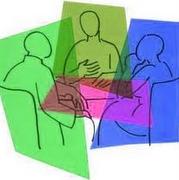Individual and Joint Sessions
I always give couples the option of meeting with me individually before we begin having joint sessions. If we have these individual meetings, they usually last about an hour. They give you an uninterrupted opportunity to tell me in confidence whatever you want, express your concerns and let me know what is important to you. Of course I will answer any questions you have.
The remaining sessions are usually all joint and last about one and a half to two hours each on average. If it would be helpful at some juncture to meet again with you individually, we can do so.
The mediation sessions are most often in person but they can also be online via videoconferencing.
Mediation Process
 My style of mediation is essentially facilitative. This means that I see my role primarily as facilitating productive discussions that will enable you to develop your own solutions and decisions. This is not, however, a passive role as I describe further below.
My style of mediation is essentially facilitative. This means that I see my role primarily as facilitating productive discussions that will enable you to develop your own solutions and decisions. This is not, however, a passive role as I describe further below.
While the process is never completely linear, we essentially take one subject at a time, identify the issues that need to be addressed and the decision-making that needs to done, talk about what is of greatest concern and interest to each of you, generate ideas for solutions, evaluate them and develop agreements acceptable to both of you.
What do I actually do in mediation sessions? Following are some of the main things:
- provide a safe, comfortable, neutral, and confidential mediation environment;
- create an agenda;
- maintain a respectful process;
- listen to you carefully;
- help you understand each other;
- intervene as necessary to help you communicate more effectively with each other;
- ask questions to help ensure everything relevant is understood and carefully considered;
- provide legal, financial and other information when it is important to your decision making and your understanding of the subject being discussed;
- balance the process so neither side is disadvantaged or dominated by the other;
- try to prevent issues from becoming overly polarized;
- help you re-examine expectations that may be unrealistic;
- provide ideas for solutions if you seem to be stuck or if you would find them helpful;
- keep the process organized and moving forward productively;
- take notes of issues, key facts, agreements and actions that need to be taken.
People often feel strong emotions in mediation sessions and sometimes feel the need to express them. This is not discouraged as long as it is done in a way that does not overly trouble the other person or inhibit progress in the mediation.
Sometimes emotional issues need to be expressed and addressed in order to make room for mutual understanding and agreement. Sometimes doing so provides breakthroughs that are important in coming to terms with the end of the relationship and being able to move forward.
Divorce mediation is forward-looking rather than therapeutic in its central purpose. In general, we therefore will not spend more time going over the past than is necessary to enable us to move forward.
Answers to commonly asked questions and blog posts give further information about the mediation process.
Reaching Agreement
 As individual agreements are reached, I will put them in writing. At the end of mediation I will write up all the agreements in a “Memorandum of Understanding.” Nothing is considered to be final until you both carefully review and sign this document. Once it has been finalized and signed, it can be incorporated into the package of documents and forms filed with the court to complete your divorce.
As individual agreements are reached, I will put them in writing. At the end of mediation I will write up all the agreements in a “Memorandum of Understanding.” Nothing is considered to be final until you both carefully review and sign this document. Once it has been finalized and signed, it can be incorporated into the package of documents and forms filed with the court to complete your divorce.







